Research Project Outcomes: A vision for inclusive educational technology
Check out Júlia Mendonça's interview for Tech Ethics Lab, about the use of technology in schools.
The potential of artificial intelligence in education is immense, reshaping the traditional learning environment. Digital tools create more dynamic and interactive lessons, boosting engagement and enjoyment while significantly enhancing accessibility.
However, as the educational landscape rapidly evolves, an important question arises: Are students’ voices—the very individuals these innovations aim to benefit—being heard and considered?
The pandemic accelerated technology integration in academic settings globally, but as IT companies hurried to implement solutions, the voices of those most impacted—students—were frequently overlooked. This oversight is significant, as it often leads to selecting methods that fail to fully address the needs of the young people they aim to serve.
Data Privacy Brasil, a nonprofit organization dedicated to protecting personal data and preserving fundamental rights, recognized this gap and launched an innovative study. Supported by the Notre Dame-IBM Technology Ethics Lab, the initiative seeks a more inclusive approach to choosing and implementing educational technologies, prioritizing students’ voices in decision-making.
Data Privacy Brasil researcher Júlia Mendonça explains that the project is based on the principles of the United Nations Convention on the Rights of the Child (CRC) to place student’s best interests at the core of decisions that impact them. “Our approach aligns with the CRC’s General Comment No. 25, highlighting the need to safeguard young people’s rights in digital environments,” she says.
Mendonça and her colleagues Bruno Bioni, Eduardo Mendonça, Marina Meira, and Carla Rodrigues argue that failing to involve the entire school community represents a missed opportunity to gather valuable insights that could improve educational outcomes. They say young people should have a voice in deciding when, why, and how technologies are integrated. The Data Privacy Brasil team goes beyond making technologies user-friendly; it’s about equipping students to take ownership of their learning.
Engaging students in the conversation
Data Privacy Brasil’s study involved students in in-depth discussions to gather their insights on which technologies they find most helpful and the contexts in which they prefer to use them.
“Consistently ignoring users’ input can lead to solutions that fail to meet actual needs or concerns,” Mendonça says, “ultimately eroding trust between stakeholders and decision-makers.”
In a soon-to-be-published journal article, the researchers examine how young adults can play a significant role in AI audits of educational technologies. They discovered that local contexts are frequently overlooked, with participatory models often failing to account for students’ unique social and regional backgrounds. This one-size-fits-all approach risks perpetuating existing inequalities by ignoring the diverse experiences necessary for meaningful educational success.
“When educational models are not tailored to specific contexts,” Mendonça says, “they may overlook issues, resulting in less effective learning outcomes.”
Moreover, such an approach can undermine traditional knowledge and practices, potentially diminishing cultural diversity. By ignoring these nuances, instructional technologies may become less relevant and effective for the students they are designed to support.
Adapting to developmental stages
As part of their study, the Data Privacy Brasil team analyzed survey data from students aged 10 to 15 who participated in a computer science training program in Santa Maria, a municipality in Rio Grande do Sul, Brazil’s southernmost state. Their analysis showed that the selected technology frequently overlooked the students’ differing maturity levels, resulting in a disconnect in engagement.
“By adjusting participation to match each student’s maturity level,” Mendonça says, “educators can strike a balance between challenge and support, enhancing confidence and skills across various age groups.”
Recognizing and adapting to developmental stages also contributes to maintaining positive classroom dynamics. According to the researchers, when teaching methods and tools are tailored to an individual’s cognitive, emotional, and social abilities, they enhance learning by helping students better appreciate and value each other’s capabilities and perspectives.
Advancing digital literacy
Digital proficiency is more than just the ability to use technology; it’s about understanding how to interact with tools responsibly and safely. Data Privacy Brasil highlights the importance of schools educating students on these topics and equipping them to protect themselves against false information.
“Digital literacy helps students critically evaluate online information and distinguish credible sources from misinformation,” says Data Privacy Brasil Founder and Director Bruno Bioni. “These skills are essential in an age where online content is ubiquitous and often unchecked.”
A central component of Data Privacy Brasil’s initiative involves the whole school community—teachers, administrators, and families—in decision-making. This collective approach amplifies students’ voices alongside those of adults, promoting shared responsibility. Bioni also stresses the importance of developing a feedback loop where all stakeholders can regularly share their observations, concerns, and suggestions.
“True participation demands that student voices are heard and have a meaningful impact,” he says. “This inclusive approach promotes a culture of transparency and trust.”
Participatory decision-making challenges
While collaborative decision-making offers numerous organizational benefits, implementing these processes has challenges. One significant risk, the researchers say, is “participatory washing,” where involvement is superficial or symbolic and lacks real influence over decisions.
Addressing the inherent power dynamics in these processes is essential. Data Privacy Brasil recommends making student participation in AI audits a central approach. By actively participating in evaluating educational technologies, students shift from passive recipients to fully engaged contributors in selecting tools that shape their learning experience.
What’s next
As AI becomes more integrated into education, it is essential to balance its benefits with potential risks. Achieving this requires a comprehensive collaboration among policymakers, tech developers, educators, and students to ensure AI is utilized effectively to enhance the quality of instruction.
The model developed by Data Privacy Brasil aims to empower young people by enabling them to play an active role in shaping their educational experiences through AI-driven evaluations and feedback mechanisms. By carefully considering students’ perspectives and integrating their insights, academic institutions can make more informed decisions when choosing and integrating intelligent technologies.
Maintaining momentum is vital as the global conversation on AI in education is still in its infancy. Ongoing focus and deliberate efforts are needed to ensure AI integration evolves into an even more powerful tool for enhancing students’ knowledge and skills.
Originally published September 23, 2024, on the Tech Ethics Lab website.
Veja também
-

AI Explainability: How to Avoid Rubber-Stamping Recommendations
Experts debate if human oversight can replace the need for the explainability of AI systems. Bruno Bioni, co-director of Data Privacy Brasil, was one of the experts interviewed. Check it out in the text!
-

Digital Merger Watch: Data Privacy Brasil joins new global initiative
The group includes national and international organizations and will focus on analyzing and challenging Big Tech’s efforts to reinforce its dominance through mergers and acquisitions.
-

Beyond Digital Rights: Towards a Fair Information Ecosystem?
One of the major challenges in the field of digital rights is the tendency toward segmentation and hyper-specialization in topics such as privacy, freedom of expression, net neutrality, data protection, and the regulation of AI systems. Learn more about the topic in the article published in Tech Policy.
-
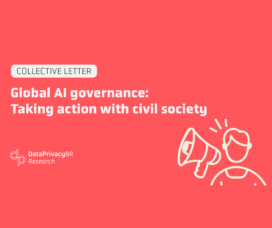
Global AI governance: Taking action with civil society
More than 40 civil society organizations call for inclusion in AI Action Summit in letter on global governance of Artificial Intelligence.
-
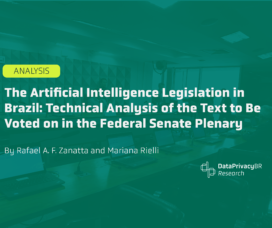
The Artificial Intelligence Legislation in Brazil: Technical Analysis of the Text to Be Voted on in the Federal Senate Plenary
The Internal Temporary Artificial Intelligence Committee (CTIA) of the Federal Senate approved the substitute report for Bill 2338/2023. This bill aims to define the legal framework for regulating the use of Artificial Intelligence systems in Brazil.
-
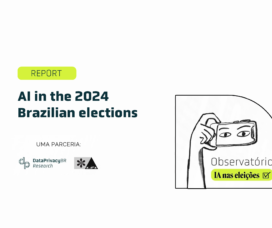
AI in the 2024 Brazilian elections
Aláfia Lab, *desinformante and Data Privacy Brasil launch the report “AI in the 2024 Brazilian elections”, with an analysis of the use of artificial intelligence in the first round of the elections.
-

A Fragmented Landscape Is No Excuse for Global Companies Serious About Responsible AI
For the third year in a row, MIT Sloan Management Review and Boston Consulting Group (BCG) have brought together an international panel of AI experts to help gain insights into the lack of alignment around global standards and norms for responsible AI. Bruno Bioni, co-director of Data Privacy Brasil, was one of the experts interviewed. Check it out in the text!
Veja Também
-

AI Explainability: How to Avoid Rubber-Stamping Recommendations
Experts debate if human oversight can replace the need for the explainability of AI systems. Bruno Bioni, co-director of Data Privacy Brasil, was one of the experts interviewed. Check it out in the text!
-

Beyond Digital Rights: Towards a Fair Information Ecosystem?
One of the major challenges in the field of digital rights is the tendency toward segmentation and hyper-specialization in topics such as privacy, freedom of expression, net neutrality, data protection, and the regulation of AI systems. Learn more about the topic in the article published in Tech Policy.
-

Global AI governance: Taking action with civil society
More than 40 civil society organizations call for inclusion in AI Action Summit in letter on global governance of Artificial Intelligence.
-

The Artificial Intelligence Legislation in Brazil: Technical Analysis of the Text to Be Voted on in the Federal Senate Plenary
The Internal Temporary Artificial Intelligence Committee (CTIA) of the Federal Senate approved the substitute report for Bill 2338/2023. This bill aims to define the legal framework for regulating the use of Artificial Intelligence systems in Brazil.
-

AI in the 2024 Brazilian elections
Aláfia Lab, *desinformante and Data Privacy Brasil launch the report “AI in the 2024 Brazilian elections”, with an analysis of the use of artificial intelligence in the first round of the elections.
-

A Fragmented Landscape Is No Excuse for Global Companies Serious About Responsible AI
For the third year in a row, MIT Sloan Management Review and Boston Consulting Group (BCG) have brought together an international panel of AI experts to help gain insights into the lack of alignment around global standards and norms for responsible AI. Bruno Bioni, co-director of Data Privacy Brasil, was one of the experts interviewed. Check it out in the text!
-
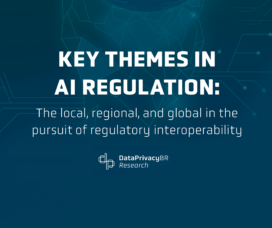
Key Themes in AI Regulation: The local, regional, and global in the pursuit of regulatory interoperability
Data Privacy Brasil releases its report “KeyThemes in AI Regulation: The local, regional, and global in the pursuit of regulatory interoperability,” supported by the Heinrich Böll Foundation. This work is the result of months of research under the project “Where the SabIA Sings: Governance and Regulation of Artificial Intelligence from Brazil”.
-
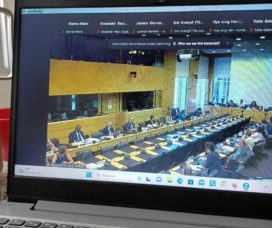
Data Privacy Brasil participates in UN’s OHCHR briefing on Brazil
The organization highlighted how the advance of edtech has been violating children’s privacy in the country
DataPrivacyBr Research | Content under licensing CC BY-SA 4.0

